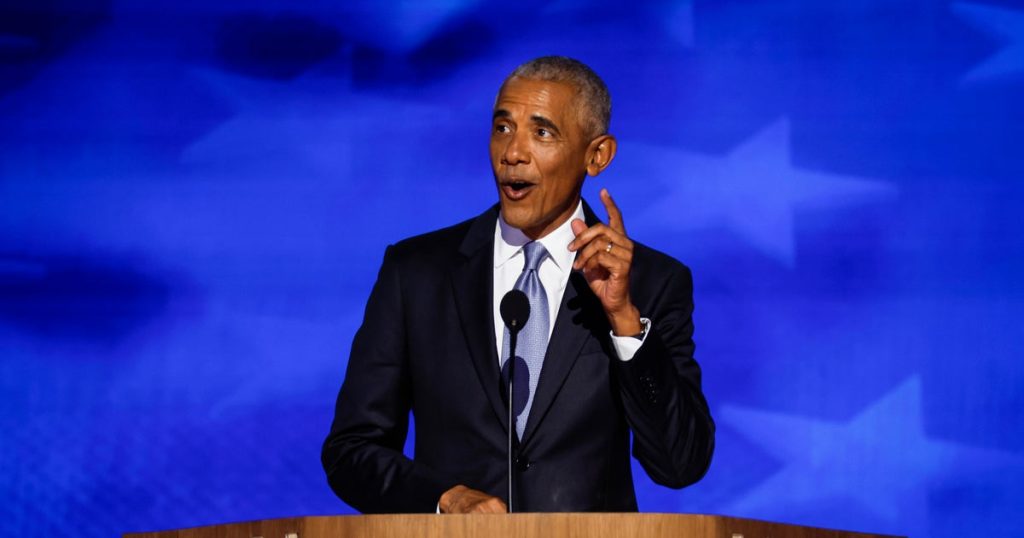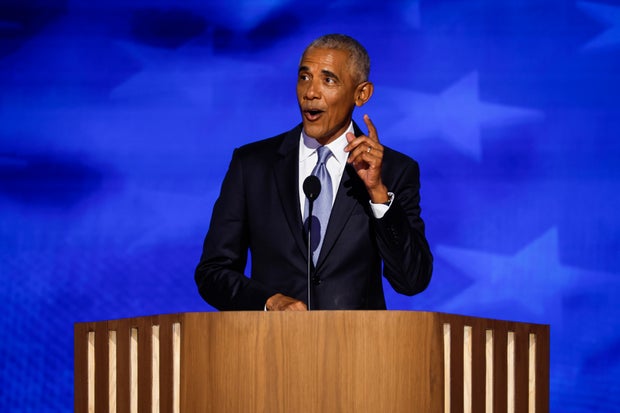Former President Barack Obama addressed political violence in the United States on Tuesday night, telling a group in Pennsylvania that the country is “at an inflection point.”
The former president addressed the recent assassination of Charlie Kirk and the attacks on two Minnesota Democratic lawmakers that left speaker of the Minnesota House of Representatives Melissa Hortman and her husband dead, and another state representative and his wife severely injured. He called both incidents “horrific” and “a tragedy.”
Obama said that political violence “is not new” and “has happened at certain periods in” U.S. history, but is “anathema to what it means to be a democratic country.”
“There are no ifs, ands or buts about it, the central premise of our democratic system is that we have to be able to disagree and have sometimes really contentious debates without resorting to violence,” Obama said during a fireside chat at the Jefferson Educational Society, a nonprofit in Erie, Pennsylvania.
Obama said that recent political violence isn’t the only worry he has about the state of the U.S. He warned that there is “a host of larger trends that we have to be concerned about.” He criticized leaders who responded to Kirk’s death with comments that could sow further division.
Chip Somodevilla / Getty Images
“There’s been some confusion, I think, around this lately, and frankly, coming from the White House and some of the other positions of authority that suggest, even before we had determined who the perpetrator of this evil act was, that somehow we’re going to identify an enemy,” Obama said. In a video statement mourning Kirk, President Trump blamed the “radical left” for his death.
“We’re going to suggest that somehow that enemy was at fault, and we are then going to use that as a rationale for trying to silence discussion around who we are as a country and what direction we should go,” Obama continued. “And that’s a mistake as well.”
He praised Utah Gov. Spencer Cox, who he said showed “that it is possible for us to disagree while abiding by a basic code of how we should engage in public debate.”
Obama said that denouncing political violence and mourning its victims “doesn’t mean we can’t have a debate about the ideas” that were being promoted. He said that while he believes Kirk’s ideas “were wrong,” that “doesn’t negate the fact that what happened was a tragedy and that I mourn for him and his family.”
Obama said that he disagreed with many of Kirk’s opinions, including his 2023 claim that Black women including Michelle Obama and Supreme Court Justice Ketanji Brown Jackson “do not have the brain processing power to otherwise be taken really seriously” and his belief in the “Great Replacement” conspiracy theory.
Trent Nelson/The Salt Lake Tribune via Reuters
“Those are all topics that we have to be able to discuss honestly and forthrightly, while we still insist that in that process of debate, we respect other people’s right to say things that we profoundly disagree with,” Obama said. “That’s how we should approach this.”
Obama joins the list of politicians and leaders who have responded to Kirk’s death by calling for an end to political violence. House Speaker Mike Johnson said Americans should “have vigorous debate, but it cannot lead to political violence.” Former President Joe Biden said political violence “must end now,” while former President George Bush said “violence and vitriol must be purged from the public square.” John Hoffman, the state senator wounded in Minnesota, said that “America is broken, and political violence endangers our lives and democracy” and asked political leaders to “call out extreme, aggressive and violent dialog that foments these attacks on our republic and freedom.”
A suspect is in custody in Kirk’s killing. Tyler Robinson, 22, has been charged with aggravated murder and other related charges, Utah County Attorney Jeff Gray said Tuesday. The state intends to seek the death penalty, Gray said. Officials have not shared a motive for the killing.
Vance Boelter, 58, faces federal and state murder and attempted murder charges in connection with the deaths of Hortman and her husband Mark, and the shootings of Hoffman and his wife.
The nation has seen multiple politically motivated acts of violence recently. In April, a man allegedly set the Pennsylvania governor’s mansion ablaze while Gov. Josh Shapiro and his family were asleep upstairs. Mr. Trump was shot at a rally in July 2024. Multiple politicians said they were reconsidering or postponing outdoor events after Kirk’s death. Nearly 9,500 threats and concerning statements were made against Congress in 2024, according to U.S. Capitol Police.




